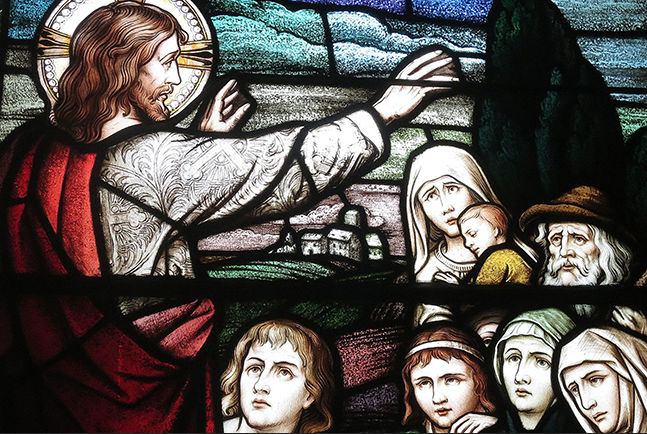Editor’s note: The following comprises the fifth chapter, first part (A9), of The Gospel of Luke: An Exposition, by Charles R. Erdman (published 1936). All spelling in the original.
9. Faithful Testimony Encouraged (12:1-12)
___________________________________________________
1 In the mean time, when the many thousands of the multitude were gathered together, insomuch that they trod one upon another, He began to say unto His disciples first of all, Beware ye of the leaven of the Pharisees, which is hypocrisy. 2 But there is nothing covered up, that shall not be revealed; and hid, that shall not be known. 3 Wherefore whatsoever ye have said in the darkness shall be heard in the light; and what ye have spoken in the ear in the inner chambers shall be proclaimed upon the housetops. 4 And I say unto you my friends, Be not afraid of them that kill the body, and after that have no more that they can do. 5 But I will warn you whom ye shall fear: Fear Him, who after He hath killed hath power to cast into hell; yea, I say unto you, Fear Him. 6 Are not five sparrows sold for two pence? and not one of them is forgotten in the sight of God. 7 But the very hairs of your head are all numbered. Fear not: ye are of more value than many sparrows. 8 And I say unto you, Every one who shall confess me before men, him shall the Son of man also confess before the angels of God: but he that denieth me in the presence of men shall be denied in the presence of the angels of God. 10 And every one who shall speak a word against the Son of man, it shall be forgiven him: but unto him that blasphemeth against the Holy Spirit it shall not be forgiven. 11 And when they bring you before the synagogues, and the rulers, and the authorities, be not anxious how or what ye shall answer, or what ye shall say: 12 for the Holy Spirit shall teach you in that very hour what ye ought to say.
___________________________________________________
When Jesus had bitterly rebuked the public religious teachers of His day He turned to His disciples and spoke words of cheer which have strengthened His followers in all days. Such encouragement was needed; the bitter hatred of His enemies now threatened the life of Jesus, and made it evident that His disciples could expect no kinder treatment than their Lord. Then, too, Jesus had shown the special guilt of those who professed to be guides in matters of religion; His disciples therefore needed courage to continue their public witness both because of the great responsibility involved and because it would bring upon them the hatred of men. He encouraged them, first, by the assurance that the corrupting influence of the Pharisees would come to an end; their hypocrisy would be mercilessly unmasked; their power would cease; while on the other hand the witness of the disciples would not always be confined to places of obscurity but would be heard in all the world. Vs. 1-3. How truly has this prophecy been fulfilled! Compare the present influence of Hillel or Gamaliel with that of Peter or John. No one can measure the power for good possessed by the humblest witness for Christ.
Jesus further encouraged His disciples by assuring them of the loving care of God. They should look to Him in reverent trust; this would give confidence and strength and free them from the fear of man. Their enemies could harm only the body; God controls the eternal destiny of souls, and to Him even the body is precious, and He is concerned with the most minute details of our lives. If He notes the fall of a sparrow, He must know the peril and need of every one who is testifying for His Son. Vs. 4-7.
Then again for faithful witnesses there remain great rewards, in spite of what they now may suffer from men. As they now acknowledge Jesus Christ as Saviour and Lord, so in the glories of heaven He will acknowledge them as His true and loyal warriors who merit and will share the blessedness of His triumphant reign. Vs. 8, 9. On the other hand, those who blaspheme His name by ascribing his power to a Satanic source, ch. 11:15, will be regarded as guilty of an unpardonable sin. This would not apply to such as in ignorance rejected Jesus, but to those who had full opportunity of knowing Him, and who then scoffed at His claims and maliciously insulted His divine Person, and made of Him an impostor and associated Him with the powers of evil. V. 10.
Last of all, in spite of opposition and threats of all the earthly powers, and in the presence of the most imposing tribunals, the witnesses of Jesus never need fear, and must never allow themselves to be silenced. The Holy Spirit, whom their enemies opposed and blasphemed, would speak through them; He would teach them both how and what to say, vs. 11, 12. This promise was not designed to encourage indolence or lack of possible preparation, but to assure the Christian witness that a divine Presence would ever give him needed wisdom and strength and grace.
It is a grave responsibility to testify for Christ, but it is the duty of everyone who bears His name; and in this service he can be assured that the influence will be measureless, the protection unfailing, the reward heavenly, the sustaining grace divine.
(Go back to previous chapter)
(Continue to next chapter)









